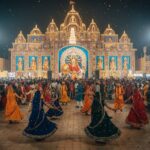For decades, Indian travel conversations revolved around where to go – Goa for beaches, Jaipur for palaces, Manali for snow. But for Gen Z, the question is shifting dramatically. It’s no longer “Goa or Kerala?” but rather “Sunburn music festival or a yoga retreat?” This generation of young travellers – typically aged between 18 and 27 – is choosing experiences over destinations, creating a new wave in India’s travel and tourism industry.
Why Beaches Are Out, Festivals Are In
Gen Z’s relationship with travel is shaped by social media, cultural curiosity, and a hunger for meaningful stories. Instead of just posting photos of beaches, they want to capture moments of local folk music sessions, street food trails, or volunteering with village artisans.
Take Goa, for example. While millennials and Gen X often flew there for sandy beaches and shacks, Gen Z is as likely to time their trips around Sunburn Festival or smaller indie music gigs. Similarly, in Jaipur, palaces remain a backdrop — but the real draw for young travellers is attending folk storytelling performances, live puppet shows, or interactive workshops on Rajasthani block printing.
“I can Google palace pictures anytime,” laughs 22-year-old Priya Sharma from Bengaluru. “But sitting with a local storyteller in Jaipur and hearing legends passed down for centuries – that’s something you can’t stream online.”
Instagrammable Means “Unique” Now
Platforms like Instagram, YouTube, and BeReal are driving this shift. For Gen Z, an “Insta-worthy” moment doesn’t just mean a picture in front of Hawa Mahal. It could be a reel of learning Garba in Ahmedabad, a candid of tasting filter coffee in a Bengaluru by-lane, or a slow-motion shot of skydiving in Mysuru.
According to a 2024 report by Booking.com, over 70% of Gen Z travellers in India said they value “unique and shareable experiences” more than traditional sightseeing.
“When I post a travel reel, I don’t want it to look like every other person’s Goa beach shot,” says 20-year-old Aditya Singh, a Delhi University student. “I’d rather show myself making pottery in a Himachal village or dancing at a Sufi music night. That’s real content.”
Homestay > Hotel
Another reason experiences dominate is Gen Z’s desire for cultural authenticity. Travel operators are seeing a spike in demand for homestays, eco-lodges, and community-based tourism. Spending a night in a Ladakhi family home, cooking traditional dishes with locals, or joining an early-morning boat ride with Varanasi’s priests is now considered more rewarding than luxury resorts.
This doesn’t mean comfort is out of the picture – but comfort comes second to authenticity.
“I’d rather stay in a clean homestay with a grandmother who teaches me how to make thukpa, than in a five-star where the food is continental and generic,” shares 23-year-old Rhea Thomas, an aspiring travel vlogger.
How Tourism Is Cashing In
Tourism boards and brands are already adapting. Goa Tourism has started promoting music and cultural festivals alongside its beaches. Rajasthan is spotlighting folk theatre, desert camping, and rural crafts. Even corporate players like Airbnb and Zostel are tailoring their campaigns to highlight immersive, localised experiences.
The economic potential is huge: the “experience economy” is one of the fastest-growing segments in Indian tourism. It not only draws young travellers but also spreads revenue to local communities – artisans, performers, storytellers, and guides.
Travel 2.0 Is Here to Stay
For Gen Z Indians, travel is no longer about “been there, done that.” It’s about “felt that, lived that.” Instead of a checklist of destinations, it’s a playlist of experiences. They are not just travellers but curators of their own cultural journeys – and in the process, they are reshaping how India itself is marketed to the world.



